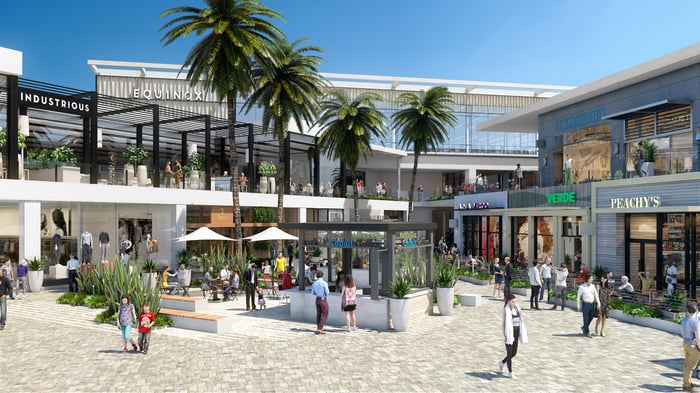In mid-2015, Seritage Growth Properties (SRG 0.65%) was formed to buy hundreds of Kmart and Sears stores. Unfortunately, Sears Holdings' rapid downfall, budget constraints, and the impact of the COVID-19 pandemic on demand for retail space sabotaged Seritage's efforts to gradually replace Sears and Kmart stores with higher-paying tenants. As of the middle of 2021, Seritage's portfolio was just 28% leased.
Over the past year, new CEO Andrea Olshan has attempted to reset Seritage's strategy to focus on a much smaller number of redevelopment opportunities. But while this strategy shift represented a step in the right direction, it didn't fix Seritage's biggest problems: rapid cash burn and a high debt load. As a result, Seritage announced last week that it launched a "review of strategic alternatives."
Investors sour on Seritage
Just a few years ago, Mr. Market was enthusiastic about Seritage Growth Properties' prospects. However, in addition to Kmart and Sears closing all of their stores in Seritage's portfolio over the past few years, several other key tenants ran into trouble and leasing activity stalled out during the COVID-19 pandemic.
Olshan's hiring in February 2021 and optimism about the pandemic winding down caused Seritage stock to rebound beyond $20 last spring. However, the REIT's lack of progress on core financial metrics like net operating income and cash flow doomed this rally. Seritage Growth Properties shares fell into single-digit territory in early 2022 and have lost three-quarters of their value over the past three years.
In short, Olshan hasn't been able to convince the market that her strategy will succeed. Seritage's assets are almost certainly worth far more than the company's current enterprise value, but investors are quite reasonably concerned about whether Seritage will fritter this value away because of its high cash burn and subpar balance sheet.
Mulling big changes
Recognizing these challenges, Seritage recently hired Barclays to lead a strategic review process, which could lead to selling part or all of the company. According to Olshan:
The Board and management believe that there is an ongoing disconnect between the Company's stock price and net asset value. The portfolio ... generally falls into the categories of cash flowing multitenant retail and triple net pad sites, residential development land, and large mixed use master planned developments. The opportunities for these underlying assets are extremely strong, and we believe that embarking on this process represents the most efficient way to unlock the full potential of this portfolio.
Seritage also announced that three members of its board plan to step down this year, including Chairman Eddie Lampert, who has already resigned from the board. Lampert indicated that he wanted more flexibility to trade Seritage shares or to participate in a bid to acquire some of the REIT's assets.
Will there be any buyers?
Seritage's strategic review represents a natural extension of its decision last year to earmark about 70 properties for eventual sale. The difference is that now, Seritage wants to accelerate and possibly expand the scope of its asset sales.
Because it owns such an eclectic mix of real estate, Seritage will probably struggle to get any fair bids for the entire company. The retail, residential, and master-planned community segments of its portfolio mainly appeal to different kinds of buyers. (That's especially true given that most of Seritage's residential and master-planned development projects haven't even broken ground yet.)

Image source: Seritage Growth Properties.
On the other hand, Seritage might find a buyer for its retail assets. Selling its mostly completed retail properties could help the REIT wipe out its debt, while narrowing its focus to residential projects and other large-scale developments. That would reduce cash burn and pivot Seritage into a market segment where valuations tend to be higher.
Putting the company up for sale isn't guaranteed to pay off for shareholders, but it's another positive step toward unlocking Seritage's hidden value.





